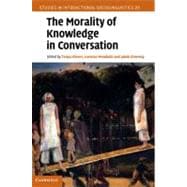
Note: Supplemental materials are not guaranteed with Rental or Used book purchases.
Purchase Benefits
Looking to rent a book? Rent The Morality of Knowledge in Conversation [ISBN: 9780521194549] for the semester, quarter, and short term or search our site for other textbooks by Edited by Tanya Stivers , Lorenza Mondada , Jakob Steensig. Renting a textbook can save you up to 90% from the cost of buying.
| List of contributors | p. ix |
| Preface | p. xi |
| Acknowledgements | p. xiii |
| List of transcription and glossing symbols | p. xiv |
| Introduction | |
| Knowledge, morality and affiliation in social interaction | p. 3 |
| Affiliational consequences of managing epistemic asymmetries | |
| The management of knowledge discrepancies and of epistemic changes in institutional interactions | p. 27 |
| Claiming epistemic primacy: yo-marked assessments in Japanese | p. 58 |
| Morality and question design: "of course" as contesting a presupposition of askability | p. 82 |
| Addressing epistemic incongruence in question-answer sequences through the use of epistemic adverbs | p. 107 |
| The epistemics of make-believe | p. 131 |
| Epistemic resources for managing affiliation and alignment | |
| Territories of knowledge, territories of experience: empathic moments in interaction | p. 159 |
| The terms of not knowing | p. 184 |
| Proposing shared knowledge as a means of pursuing agreement | p. 207 |
| Ways of agreeing with negative stance taking | p. 235 |
| Epistemics and embodiment in the interactions of very young children | p. 257 |
| Toward a framework | |
| Sources of asymmetry in human interaction: enchrony, status, knowledge and agency | p. 285 |
| References | p. 313 |
| Index | p. 333 |
| Table of Contents provided by Ingram. All Rights Reserved. |
The New copy of this book will include any supplemental materials advertised. Please check the title of the book to determine if it should include any access cards, study guides, lab manuals, CDs, etc.
The Used, Rental and eBook copies of this book are not guaranteed to include any supplemental materials. Typically, only the book itself is included. This is true even if the title states it includes any access cards, study guides, lab manuals, CDs, etc.